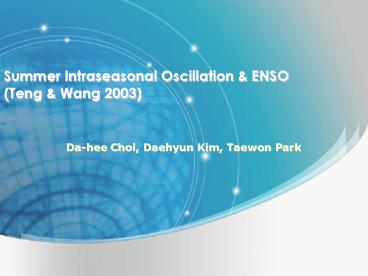Summer Intraseasonal Oscillation
1 / 15
Title: Summer Intraseasonal Oscillation
1
Introduction
Summer Intraseasonal Oscillation ENSO (Teng
Wang 2003)
Da-hee Choi, Daehyun Kim, Taewon Park
2
Introduction
- ISO (IntraSeasonal Oscillation)
- Winter ISO eastward propagation (MJO)
- Summer ISO Indian monsoon ? northward
propagation - WNP ? northwestward
propagation - The amplitude of ISO is stronger when local SST
is warm. However, unable to detect influence
from ENSO. - The overall MJO activity is uncorrelated with
ENSO. All these studies focused on the boreal
winter MJO.
Active Break of monsoon rainfall
3
Interannual Variations of the Boreal Summer ISO-
Overall intensity
- Our study focuses on the boreal summer season
from May to October. - Filter 10 90 day
- Standard deviations are used to represent the
amplitude of ISO.
4
Interannual Variations of the Boreal Summer ISO-
Overall intensity
Interannual variation
Correlation between ISO Intensity ENSO
- Although climatologically the Bay of Bengal is
the most active center for the summer ISO, its
interannual variation is weaker than in the WNP. - The ISO intensity shows the most significant
correlation with Nino3.4 SST in the western and
central Pacific. - Both convection and lower-troposphere circulation
show pronounced interannul variation in the ISO
intensity in the WNP, which is closely linked
with ENSO.
5
Interannual Variations of the Boreal Summer ISO
MAY-JUL
AUG-OCT
- Period for zonally propagating wavenumber-1 OLR
anomalies at 40E-180 - Kemball-cook Wang (2001) ISO behavior change
within the summer - MJJ ? equator eastward (40E-180)
- ASO ? 10-20N westward strengthen (100E-180)
- Switch of the dominance from MJO in MJJ to the
off-equatorial westward-propagating ISO in ASO is
associated with the monsoon annual cycle.
6
Interannual Variations of the Boreal Summer ISO-
The MJO (eastward propagation at 40E-180)
- Analysis period May-July
- MJO index is defined as the mean spectrum
density for 20-50 day eastward propagating
wavenumber-1(at 40E-180) - OLR MJO index anomalies averaged at 2.5S-5N
during 1979-2001 - ?500 MJO index at 5S-10N during 1958-2001
- The tight MJO-ENSO correlation in May-July is in
a sharp contrast with the insignificant
correlation previously found between the boreal
winter MJO and ENSO.
7
Interannual Variations of the Boreal Summer ISO-
Westward-propagating ISO in the WNP
- The WNP ISO has a predominant northwestward
propagation - ( Lau Chan 1986)
8
Interannual Variations of the Boreal Summer ISO-
Westward-propagating ISO in the WNP (at 100E-180)
- Analysis period July - October
- ISO index is defined as the mean spectrum
density for 10-50 day westward propagating
wavenumber-13(at 100E-180) - V850 ISO index anomalies averaged at 5-20N
during 1958-2001 - Correlation between V850 ISO index Nino 3.4
SSTA 0.62
9
Interannual Variations of the Boreal Summer ISO-
Northward-propagating ISO (at 5S-25N)
mean
Correlation between wavenumber-1 northward
propagating U850 anomaly Nino 3.4 SSTA
(19582001)
160E
Std dev
- Analysis period May October
- period for wavenumber-1 northward propagating
U850 anomalies at 5S-25N in May-Oct - over WNP northward propagating ISO variation is
correlated with Nino 3.4 SSTA.
160E
10
Why is the WNP ISO intimately linked to ENSO?
11
Relationship to Mean state ISO intensity
- Compared with the ISO in the Indian monsoon
region, the ISO in the WNP is found more
sensitive to change in summers mean state. - WNP ISO intensity can be explained by summer
mean state.
Correlation between boreal summer ISO intensity
and seasonal mean state using U850 in May-Oct
12
Vertical shear ENSO
May-Oct averaged U850-U200 shear
- WP transition area between easterly and
westerly shear - However, El Nino
- WP easterly vertical shear strengthen
- lower troposphere westerly anomalies
- Upper troposphere easterly anomalies
May-Oct averaged U850-U200 shear difference El
Nino La Nina
13
Vertical wind shear mechanism
- The vertical shear of zonal flow has a
remarkable impact on Rossby wave. (Wang Xie
1996) - During El Nino, the enhanced mean easterly
vertical shear over WNP is responsible for the
enhanced emanation of the moist equatorial Rossby
waves. (Kemball-cook Wang 2001)
WNP
eq
CP
14
Relationship to Vertical shear ISO intensity
1st SVD mode between vertical wind shear V850
ISO intensity
- The dominant interannual modes of the summer ISO
intensity in V850 (Jul-Oct) are related to summer
mean vertical shear (May-Oct).
15
Conclusion
- May-July MJO
- July-October northwestward propagation in the
WNP - May-July MJO July-October northwestward
propagating ISO mode in the WNP are sensitive to
ENSO. - The linkage between ENSO northwestward
propagating ISO in the WNP can be explained by
the vertical wind shear mechanism.































